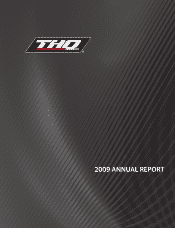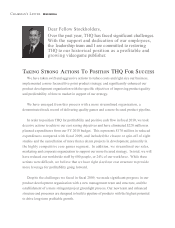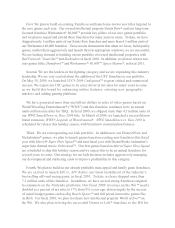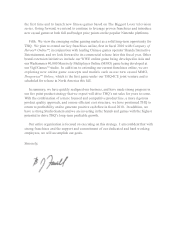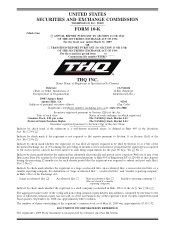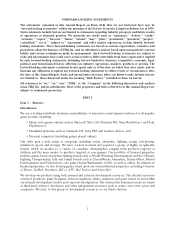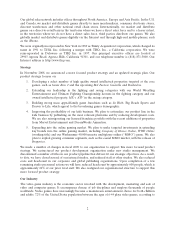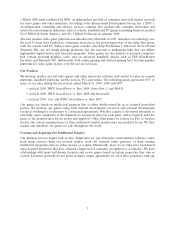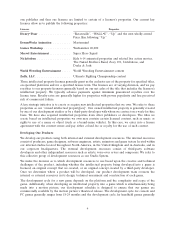THQ 2009 Annual Report Download - page 3
Download and view the complete annual report
Please find page 3 of the 2009 THQ annual report below. You can navigate through the pages in the report by either clicking on the pages listed below, or by using the keyword search tool below to find specific information within the annual report.implemented a more focused ve point product strategy, and signicantly enhanced our
product development organization with the specic objectives of improving product quality
and predictability of time to market in support of our strategy.
demonstrated track record of delivering quality games and a more focused product pipeline.
In order to position THQ for protability and positive cash ow in scal 2010, we took
decisive actions to achieve our cost saving objectives and have eliminated $220 million in
planned expenditures from our FY 2010 budget. This represents $170 million in reduced
expenditures compared with fiscal 2009, and included the closure or spin-off of eight
studios and the cancellation of more than a dozen projects in development, primarily in
the highly competitive core gamer segment. In addition, we streamlined our sales,
marketing and corporate organization to support our more focused strategy. In total, we will
have reduced our worldwide staff by 600 people, or 24% of our workforce. While these
actions were difcult, we believe that we have right sized our cost structure to provide
more leverage for protability going forward.
Despite the challenges we faced in scal 2009, we made signicant progress in our
establishment of a more stringent project greenlight process. Our new team and enhanced
to drive long-term protable growth.
Over the past year, THQ has faced signicant challenges.
With the support and dedication of our employees,
growing videogame publisher.
We delivered on our product quality promise with strong Metacritic ratings of 80+ for
scal 2009 releases Saints Row® 2, WWE® SmackDown® vs. Raw® 2009, de Blob®,
Warhammer® 40,000™: Dawn of War® II and other titles. Our fiscal 2010 product
pipeline continues to emphasize our commitment to delivering high quality entertainment
for gamers. During the rst quarter of scal 2010, we launched our rst games based on
the popular Ultimate Fighting Championship® (UFC®) and the rst open-world version of
our Red Faction® franchise to strong critical (both games rated 80+) success. We expect
our upcoming fiscal 2010 releases such as MX vs. ATV™ Reflex™, Darksiders™ and
WWE® SmackDown® vs. Raw® 2010 to also exemplify our product quality promise.
Our Studio System remains a key driver of future growth, with more than 1,200 THQ
employees in our product development organization, including those at eight internal
studios, as well as a network of external studios creating a strong pipeline of games.
Our award-winning Studio System and our product quality success give us confidence
in executing on our five point product strategy, which we introduced in November of
2008 to address the market trends that have unfavorably affected our business during the
current hardware cycle.
We have identied several key trends affecting our industry. The quality bar continues to
be set higher for games targeted to avid or “core” gamers and the cost to deliver this quality
has increased signicantly compared with previous hardware cycles. Growth in the kids
licensed business has slowed considerably and the business has become less protable as
consumers have shifted away from licensed content to more family and casual entertainment.
In addition, the family gaming segment is large and growing, particularly among females
and casual gamers. Lastly, more gamers are buying and playing games online.
Based on these trends, coupled with THQ’s competitive strengths, in November 2008,
we announced a more focused ve point product strategy as follows:
Delivering on Our Product Quality Promise
Focused Product Strategy

